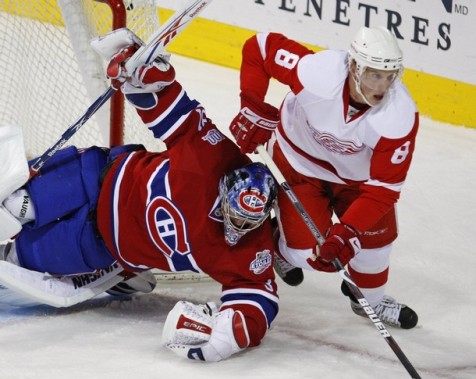
Justin Abdelkader, the 22-year old rookie center for the Detroit Red Wings, scored two consecutive insurance goals in Games 1 and 2 of the Stanley Cup finals against the Pittsburgh Penguins. Abdelkader, who was called in as a replacement for an injured Tomas Kopecky, plays on Detroit’s fourth line and is making unexpected headlines with his first, and timely, NHL career goals.
As you can probably tell by his surname (which NHL commentators hilariously mispronounce) there is another exciting fact about Justin Abdelkader: He is of Jordanian descent. The last time I heard about an Arab ice hockey player was when Ramzi Abid (a Muslim of Tunisian descent) played for the Nashville Predators. Abid no longer plays in the NHL, so from what I understand, Abdelkader is currently the only Arab in the league.
As I ran searches to learn more about Abdelkader’s ethnic background, I came across many comments on internet forums and fan websites that said, “He doesn’t look Arab at all” or he is the “least-Arabic looking person with an Arabic last name.” These comments reminded me of an article I read a few years ago called “What Does a Muslim Look Like?” by Mona Eltahawy, an Egyptian-American Muslim, where she writes about the stereotypical images of Muslims that many non-Muslims expect to see based upon limited media coverage and representation. I saw one comment on a forum that read, “[Abdelkader] definitely doesn’t look Muslim.” No, Abdelkader is not Muslim, but even so, what is a Muslim supposed to look like? Islam is a religion open to all people, regardless of ethnicity. There is no such thing as a “Muslim look.” In response to those who say Abdelkader “doesn’t look” Arab: What is an Arab supposed to look like?
Confusion regarding Abdelkader’s appearance and Arab background stems from the stereotype that all Arabs are dark-skinned. What seems to be overlooked (and perhaps unknown to many people) is that the Arab world consists of 25 countries populated by cultural, religious, and genetic diversity. It’s not uncommon to see some fair-skinned Arabs like Justin Abdelkader in countries like Syria, Lebanon, Palestine, and Jordan. For history buffs out there, this shouldn’t come to a surprise since those regions were colonized and ruled by Western imperialism and empires several times throughout history (Romans, Greeks, Crusaders, French colonialists). On the other hand, Arabs from North Africa (like the aforementioned Ramzi Abid) and the Gulf areas tend to be darker-skinned.
Of course, this is not to say all Arabs from Lebanon, Syria, Palestine, and Jordan are light-skinned. For instance, there are some Syrian Muslims at my Mosque who are blonde-haired and light-skinned, and there are some who are dark-skinned. What also needs to be factored in is the possibility that Justin Abdelkader’s grandmother is not Arab, since it is only reported that Justin’s grandfather is Jordanian. Regardless, when we make statements like, “He doesn’t look Arab,” we’re reinforcing the stereotype that Arabs have a certain or specific “look.” It also underlines the immense amount of influence that the media has played in shaping our perception of Arabs.
At the 2009 CAIR (Council on American-Islamic Relations) banquet in Springfield, Pennsylvania, Arab-American comedian, Dean Obeidallah, pointed out that since he doesn’t fit the stereotype of how an Arab is “supposed to look like,” many people have made racial slurs about Arabs around him. When he told them he was Arab, they replied, “You don’t freakin’ look like it!”
On a positive note, it’s great to see an Arab-American like Justin Abdelkader making a notable presence in the NHL. The recent spotlight on him is an excellent way to break stereotypes about Arabs, especially for those who may not personally know or interact with many Arabs.
Enjoy watching his awesome first goal in game 1:

